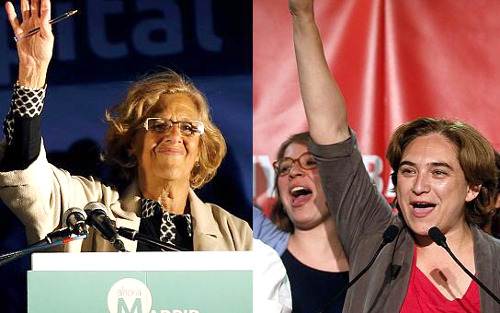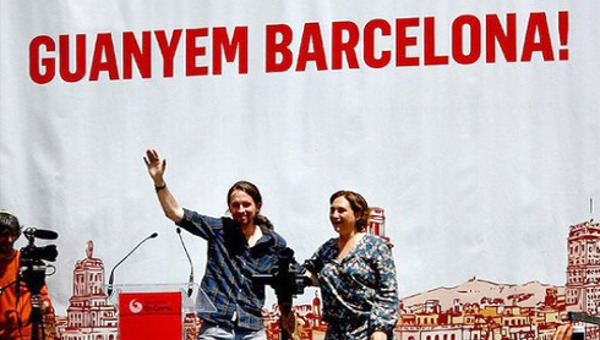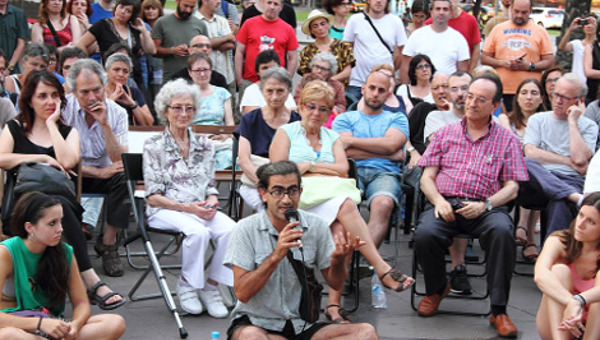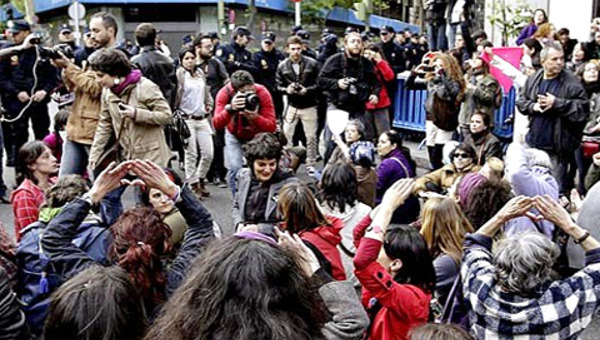Barcelona and Madrid are won. With Ada Colau and Manuela Carmena, two women will now occupy the mayoralties of both metropolises. Barcelona en Comú and Ahora Madrid were the names of the municipal connective platforms. Barcelona en Comú won the most seats in the city and can form a left-wing majority with both leftist parties for Catalonian independence, the Republican
Left of Catalonia (ERC) and the Popular Unity Candidates (CUP), as well as with the Catalan Socialist party. Ahora Madrid rests only one seat behind the right-wing ruling party People’s Party (PP), but can form a left-wing majority with the Spanish Socialist Workers’ Party (PSOE). After decades the PP can now be expelled from the mayoralties. The PP is in collapse everywhere; even where it holds steady it has lost its absolute majorities.

At the same time, the right-wing anti-corruption party Ciudadanos was unable to gain as much as expected and as a result fails by a large margin to be a majority creating coalition partner for the PP. In the five largest cities of the country left-wing majorities will now govern: in addition to Madrid and Barcelona, we can add Valencia, Seville and Zaragoza, but also A Coruña, Cádiz, Santiago de Compostela and Terrasa.1 “The democratic revolution is beginning in the cities,” rejoiced Ada Colau on election night. Some preliminary lessons can be drawn from all this.
Enormous Social Mobilization
The background to the good results achieved by the municipal connective platforms is the enormous social mobilization that occurred since the public square occupations of the anti-austerity 15M-Movement. From the squares the movement spread into the neighbourhoods without dissipating. It brought into being solidarity networks and structures that were capable of meeting immediate daily needs and easing hardships on the basis of mutual assistance. These new mass organizations, the various waves of protest in the spheres of healthcare and education, and most notably the platform against forced eviction (PAH) did not limit themselves to simply offering assistance, but were themselves locations of political action, organization and education. They are the basis of the new platforms, which after the capture of civil society are now taking over municipal governments.
1. Mobilization of the Poor and Precarious:
The strong anchoring and presence of the connective platforms in the neighbourhoods by the movements supporting them has led – at least in Madrid and Barcelona where the data is available – to increasing voter participation in the poor neighbourhoods. Though total voter turnout remained at about 50 per cent, in the high-rise neighbourhoods of Vallecas and Villa de Vallecas 5 to 7 per cent more people participated in the election than in 2011. In Barcelona, in Nou Barras 8 per cent more went to the polls, in Sants 9 per cent more.2 The articulation of discontent by means of interventions into concrete everyday problems, supported by the construction of solidaristic structures, can develop new appeal. By the linking of protest, the direct improvement of social conditions, and the experience of self-empowerment, the mobilization of people who otherwise no longer expect much from democracy is possible. There are definitely majorities to be won on the left and below – while Podemos focused on the supposed middle, where everyone bustles about and competitors like Ciudadanos wait. This can be a lesson for Podemos, but also for Die Linke in Germany (the positive experience of the latest elections in Bremen confirms this).
2. A compelling narrative and a hopeful perspective:
Podemos has recently concentrated too much on the corrupt “castes” as an opponent. The alternative became increasingly wishy-washy so as not to scare any bourgeois voters from the middle. Podemos increasingly resembled the other parties who only scramble for power. With stagnating opinion polls and a negative media campaign, its myth is fading away. In contrast, with post-authoritarian charisma, Ada Colau and Manuela Carmena embodied precisely the hope of democratic renewal based on clear political perspectives, a grassroots orientation, and of transformation from the neighbourhoods and individuals outwards. This was ultimately the impetus for the 15M movement, the PAH platform against evictions, and the waves of protest, which with Podemos threatened to fade into the background.
The pursuit of this organic-popular option, which builds on daily and close cooperation with the movements and solidarity structures, and that with newly won credibility seeks to also represent other sections of the population, was ultimately more successful than the discursively constructed populism of Podemos, which only discursively united and condensed in the media the convergence of the many diverse groups, demands, identities and cultures. The connective platforms were able to connect both strategies, i.e. grassroots orientation as well as representation. The platforms do not wish to be ‘movement parties’, but to also reach groups that movements reach only with difficulty or not at all, groups who for perhaps good reasons have turned away from politics. An anchoring in and a link with the active sections of the population and all manner of left-wing organizations and movements is not enough. Ada Colau wants to appeal to the “unorganized social majority,” “to those people who are neither active in movements nor in parties.”3 This brings self-organization, participation and representation into a new relationship.
3. A brand is not enough:
Podemos has made gains, but not nearly enough. The socialist PSOE has registered large losses, but is still able to hold up as the strongest or second strongest party (after the PP) in many regions and municipalities. In several autonomous communities (similar to the German states) it can now with the help of Podemos displace the right-wing conservative PP from government, as in Castilla La Mancha. Were there to be a similar situation with the Parliamentary elections this coming autumn, Podemos would shrink to being the junior partner for the socialists. If they were to reject such a coalition they then risk a continuation of rule by the right-wing conservatives, eventually with the new right-wing party Ciudadanos, and the continuation of austerity.4
Going it alone is not enough. Podemos achieved better results as a part of the connective platforms. Barcelona en Comú wanted more. “We want to win, this is the big difference. And to win you have to combine efforts. Anyone going it alone, is an exercise in arrogance,” according to Colau. Such a uniting of different forces does not occur on its own. This came about with hard work, in open assemblies. The success can also be an important impetus for a perspective of a Unidad Popular, a connective popular union of transformative forces.
4. A crucial test for the United Left:
A party whose structure is unable to adapt in such a historical situation of social mobilization will disappear into irrelevance. With few exceptions, Izquierda Unida was destroyed and left without parliamentary representation where it did not enter as part of a municipal platform, but ran on its own list with its own candidates and on its own brand. “We have already experienced times with only one deputy,” was stated on election night in Madrid. Such an odd slogan of perseverance in view of the historical possibility to form a government and to end the regime of austerity together, as part of a Unidad Popular. A section of the leadership risked splitting the party for the sake of their own candidacy and being responsible for the departure of progressive cadres and personalities. In the end the 4 per cent of – lost – votes for the IU were lacking, to drive the PP from the government of the autonomous community of Madrid (together with Podemos and the PSOE). The General Coordinator Cayo Lara has been weakened. The new party line from Alberto Garzon, the official candidate for the federal elections, and others has been strengthened. This perhaps at the right time, since the many engaged members of the party, who have been active for years in the social movements and as part of the 15M, have recently been increasingly demoralized by the narrow-minded struggles within the party. They are expecting a renewal.
5. The end or the renewal of social democracy:
The socialist PSOE must now also decide on a political direction. For a long time they derided competition from the left as unsound, radical “anti-sistemas.” Until recently, together with the PP, they defended the old constitutional consensus dating from the transition from dictatorship to democracy and supported the austerity regime. Yet on election night the PSOE declared that it had the “responsibility to form progressive governments” where possible. For this the party must renew itself from the ground up. It must use this chance if it does not want to become a relic of the past like the Greek PASOK party. Cooperation with the transformative forces to the left of PSOE on the municipal and regional levels can be put to the test in the period leading up to the parliamentary elections this autumn.
The democratic rebellion has begun. •
This article was first published at LuXemburg.
Translation by Sam Putinja.





